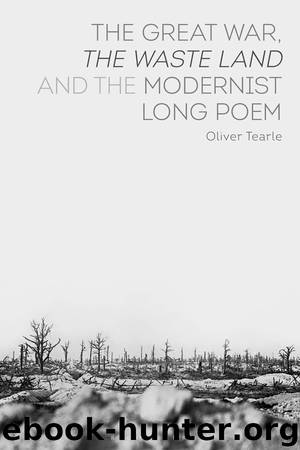The Great War, The Waste Land and the Modernist Long Poem by Oliver Tearle;

Author:Oliver Tearle;
Language: eng
Format: epub
Publisher: Bloomsbury UK
The ‘swarming’ that will be retained in the poem is that of those hooded hordes from the east, but the above lines contain an implicit nod to the war, and to the ‘baby boom’ that followed: post-war London was a space marked by memories of those who had given their lives in the conflict, but also by a mass increase in population. ‘The largest “birth bulge” experienced in Britain occurred between 1918 and 1920’, Christina R. Victor observes; this ‘post-First World War baby boom was larger than that which occurred after the Second World War’.69 Catherine Gallagher has charted modernism’s interest in ‘the Malthusian obsession with fertility’, and The Waste Land, far from being the deserted land we might expect from the poem’s title, is in fact a poem teeming with life, reminding us of the crowded state of the metropolis, whether it is the small bedsit occupied by the typist (whose divan, we learn in l. 226, doubles up as her bed) to the ‘crowds of people, walking round in a ring’ whom Madame Sosostris sees (l. 56).70 In The Economic Consequences of the Peace, John Maynard Keynes had summoned the state of post-war Europe: ‘The war had so shaken this system as to endanger the life of Europe altogether. A great part of the Continent was sick and dying; its population was greatly in excess of the numbers for which a livelihood was available; its organization was destroyed, its transport system ruptured, and its food supplies terribly impaired.’71 Eliot was all too aware of the cramped spaces of overpopulated London: at Lloyd’s Bank he worked in underground offices, while his early poetry about the city hints at the idea of overcrowding in the ‘basement kitchens’ of ‘Morning at the Window’ and the ‘thousand furnished rooms’ of ‘Preludes’.72
Such hopes of ‘a new start’, of course, depend in The Waste Land on transcending the body, as exemplified by the fire sermon’s emphasis on bodily negation in order to attain spiritual enlightenment. Comparing Eliot with an unlikely contemporary Marie Stopes, whose Married Love was published in 1918, Aimee Armande Wilson has recently argued that ‘Eliot and Stopes expressed contrasting views on the role of sex and the body within religion’, since whereas ‘Stopes saw sex as an act that draws humans closer to god’, conversely ‘enlightenment in The Waste Land brings with it disembodiment’ and so ‘the problem of incessant pregnancy will presumably disappear in a rejuvenated modernity’.73 Wilson also observes of the closing section of ‘A Game of Chess’ that it ‘emphasizes the degeneracy of the rapidly reproducing poor masses’ and ‘we are not encouraged to sympathize with’ Lil in this scene.74 But once again, the poem invites neither sympathy nor disdain: the allusion to Ophelia’s last words in the final line of ‘A Game of Chess’ is poised between identification (Lil, like Ophelia, is a woman cruelly undone by the men around her and for whom death is seen as the only escape) and distinction (Ophelia’s words have a
Download
This site does not store any files on its server. We only index and link to content provided by other sites. Please contact the content providers to delete copyright contents if any and email us, we'll remove relevant links or contents immediately.
| Ancient & Classical | Arthurian Romance |
| Beat Generation | Feminist |
| Gothic & Romantic | LGBT |
| Medieval | Modern |
| Modernism | Postmodernism |
| Renaissance | Shakespeare |
| Surrealism | Victorian |
4 3 2 1: A Novel by Paul Auster(11108)
The handmaid's tale by Margaret Atwood(6906)
Giovanni's Room by James Baldwin(5949)
Big Magic: Creative Living Beyond Fear by Elizabeth Gilbert(4772)
Asking the Right Questions: A Guide to Critical Thinking by M. Neil Browne & Stuart M. Keeley(4634)
On Writing A Memoir of the Craft by Stephen King(4258)
Ego Is the Enemy by Ryan Holiday(4034)
Ken Follett - World without end by Ken Follett(3999)
The Body: A Guide for Occupants by Bill Bryson(3873)
Bluets by Maggie Nelson(3752)
Adulting by Kelly Williams Brown(3711)
Guilty Pleasures by Laurell K Hamilton(3626)
Eat That Frog! by Brian Tracy(3559)
White Noise - A Novel by Don DeLillo(3460)
The Poetry of Pablo Neruda by Pablo Neruda(3401)
Alive: The Story of the Andes Survivors by Piers Paul Read(3342)
The Book of Joy by Dalai Lama(3267)
The Bookshop by Penelope Fitzgerald(3255)
Fingerprints of the Gods by Graham Hancock(3248)
